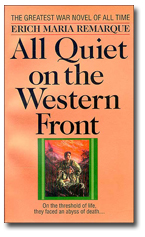Books |
All Quiet on the Western Front
Erich Maria Remarque
By
Published: Jan 01, 2006
Category:
Fiction
The reaction to this book, from the beginning, was astonishing. Published in 1929, it sold 1.2 million copies in its first year. The film won Oscars for Best Picture and Best Director in 1930 and sits securely at number 54 on the American Film Institute’s list of the best movies ever made. To order the paperback from Amazon, click here. For the Kindle edition, click here.]
Hitler and Goebbels hated every version of this story; they banned and burned the book. (The French, for reasons I can’t fathom, banned the film until 1962.) Remarque was vilified in Germany — the authorities noted that his real last name was "Remark," and that name spelled backwards was "Kramer", which was surely the author’s real, Jewish name — and had to leave the country. In 1943, the Nazis executed his sister, in part for being related to the author. The executioner used an ax.
The story of the book is largely autobiographical. Remarque was a university student who had to enlist in the German army when he turned 18. On the Western Front, he was wounded five times. When the war ended, he worked as a teacher, stonecutter and test driver before taking up writing. The standard advice — "Write what you know" — worked for him; "All Quiet on the Western Front" was his first novel.
Told in the first person, we meet Paul Baumer on the chow line, five miles behind the front. After a siege of 14 days, his company has been relieved. Now their bellies are full. And there’s still more food. That’s because 150 men went to the front and only 80 returned. No one had informed the cook. Double rations are only the start of the bounty….
These are not the troops of 1914, who inhaled the fumes of patriotism and rushed into battle. These are the recruits of 1917, when it’s clear the Germans are not winning. From the very beginning of the book, they know too much to be conned by waving flags and politicians grown fat on their own rhetoric: "No one [back home] had the vaguest idea what we were in for. The wisest were just the poor and simple people. They knew the war to be a misfortune, whereas those who were better off, and should have been able to see more clearly what the consequences would be, were beside themselves with joy."
The squad leaders are stupid and officious and a bit cowardly. As well they might be — the average life span of an officer on the front lines was 22 minutes. And it wasn’t much better for the grunts. Seven of Paul’s friends started out with him. By 1918, he’s the sole survivor. At 20, he feels old: "I know nothing of life but despair, death, fear and fatuous superficiality cast over an abyss of sorrow."
But the tone of the book is hardly heavy. War brings out vulgarity and tenderness, riotous laughter and collective gloom, and it’s these alternating emotions that make the characters unforgettable. "All Quiet" is the proverbial "easy read" — that’s one reason it’s assigned so often in schools. But it’s not so susceptible to the questions you find in reading group guides. It’s thornier than that. In the end, we’re asked to figure out, yet again, why generations of young men are sacrificed by their governments — and why they participate in this ritualized slaughter.
War has changed greatly since 1918. I’m not so sure soldiers have. Which is why this will be an essential book long after the world has forgotten about trenches and mustard case and barbed wire.


